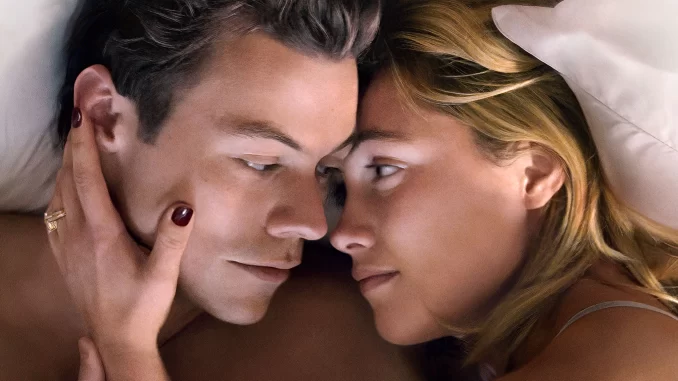
The men, all handsome, go off to work each morning, while the women, all pretty, look after the kids or soak themselves in afternoon cocktails with their neighbors’ wives. (Or they do both.)
It’s an arch blending of Mad Men chic (with a bright polish) and Manhattan Project secrecy. Of course, there is an ominous hum underlying all this sozzled good-living, the sense that nothing this perfectly secure and uniformly agreeable could be real.
We probably sense that because we’re familiar with The Stepford Wives, or The Truman Show, and other movies and television shows that present an outwardly pristine, if antiquated, design for living that ripples with sinister, unseen energy.
Wilde’s film wears those influences plainly and without much re-styling. Still, the film looks good and is filled with peppery performances. In the lead is Florence Pugh, that great 20-something phenom who burst onto the scene a few years ago in Lady Macbeth and has since delivered one striking performance after another.
Pugh’s performance recognizes Alice’s growing worry, and the other spouses get along well with her. When Styles expresses emotion, there is a certain flatness, but otherwise, he moves boldly in the frame. After this, I’d be interested to watch him in anything else.
Don’t Worry Darling is directed by Olivia Wilde and written by Katie Silberman, Carey Van Dyke, and Shane van Dyke. The film starts out well enough, but falters as it tries to work out what’s happening to Alice. It shows us essentially the same scene over and over again: Alice seeing something unnerving only to be told, in gaslight-y terms, that she’s imagining things.
Don’t Worry. Darling’s execution offers no new insights on the subject of women’s subjugation under forces of anti-feminism. There are even some contradictory elements to the grand secret premise of the film, a muddled clash of faux-empowerment and Handmaid’s Tale-debasement.
When that reveal comes, the film caves in. The intention here is to tell a pertinent story about women’s subordination under the modern forces of misogyny, which has hardened into an aggressive sociopolitical ideology fueled by pseudo-intellectual public figures.
What energy the movie had has been sapped. Once the film starts showing its cards, it hurries to its climax and conclusion, complete with an unconvincing car chase and a murder. It staggers across the finish line as it asks us to consider something profound, a great re-awakening that will lead to a mighty reckoning for the movie’s bad men. We don’t get to see that bit, because Don’t Worry Darling has used up all its tricks.
Don’t Worry. The pair crackle well together, and in their shared moments, the film briefly feels spiky and inventive. There’s a vivid scene in which Alice confronts the community’s shifty, sauntering overseer.
